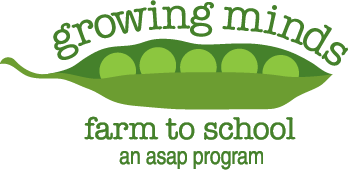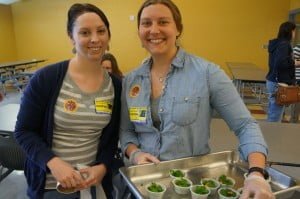Guest post by Growing Minds Spring intern Lizzie Sager
“It looks gross, but it tasted good!” – Exclamation from a North Buncombe Elementary student after trying greens and white bean dip
If I’ve learned anything from conducting ASAP Growing Minds taste tests in four different elementary schools in Western North Carolina, it is that kids don’t hold back on their opinions. They’ll tell you right away whether they like something or not, or let their facial expressions do the talking. From the repeated observations of kale chips looking like “dried leaves” to asking for seconds and thirds of the greens and white bean dip, they won’t hesitate to tell you how they really feel! Their comments make me smile, chuckle, or occasionally hold back from out-right laughing at a pained facial expression.
“I’d eat it again! I’d eat it three times!” – another North Buncombe Elementary student
What has surprised me and Kristen (the other Growing Minds intern) the most about who tries and doesn’t try a new, fresh food made from local ingredients is how much peer pressure can come into play, and at what age. Most kindergartners and first graders will try anything. Third through fifth graders will often pass on trying it until their friend takes a sample, soon the whole table wants a tasting cup! What does this tell us about how we can use peer pressure in a positive way to build healthier habits in kids? Kristen is about to start her year-long internship to become a Registered Dietitian (RD) while I am about to attend a graduate program in Public Health (MPH.) These taste tests give us unique insight into impacting health behavior by getting kids to try something healthy, local, and often new to them. These insights let us ask questions that pertain to our future academic and career endeavors.
“Which farm did it come from?” – question from a Mills River Elementary student after hearing that the spinach in their greens and white bean dip came from the same farm as the spinach that was in their greens smoothies a couple weeks before.
One of our favorite parts of taste tests are when the kids ask questions like “What is in that?”, “How do you make it?”, or my favorite, “where did it come from?” For a few weeks we used local kale from Jake’s Farm which is named after the farmer’s dog. Telling them that cute story and having them follow up with stories about their family or grandparent having a farm lets us know that at least some of the kids see a connection between what they eat and where their food is grown, a huge disconnect for most children and adults in the United States. ASAP’s overarching theme is to connect people as consumers and eaters to farms and farmers (and vice versa.) Growing Minds’ further goal is to give children a relationship and familiarity with fresh and local food, whether by getting their hands dirty digging for worms in the garden or participating in a cooking demonstration in their classroom. As interns we see the taste tests we conduct as a bridge to both of these laudable goals. Through our interactions with these K-5 students we become representatives to them of something new, healthy, and local; leading one student at Fairview Elementary to ask us:
“What are you bringing us to taste next month?”
Growing Minds interns Kristen and Lizzie serving local kale and sweet potato salad at Mills River Elementary


